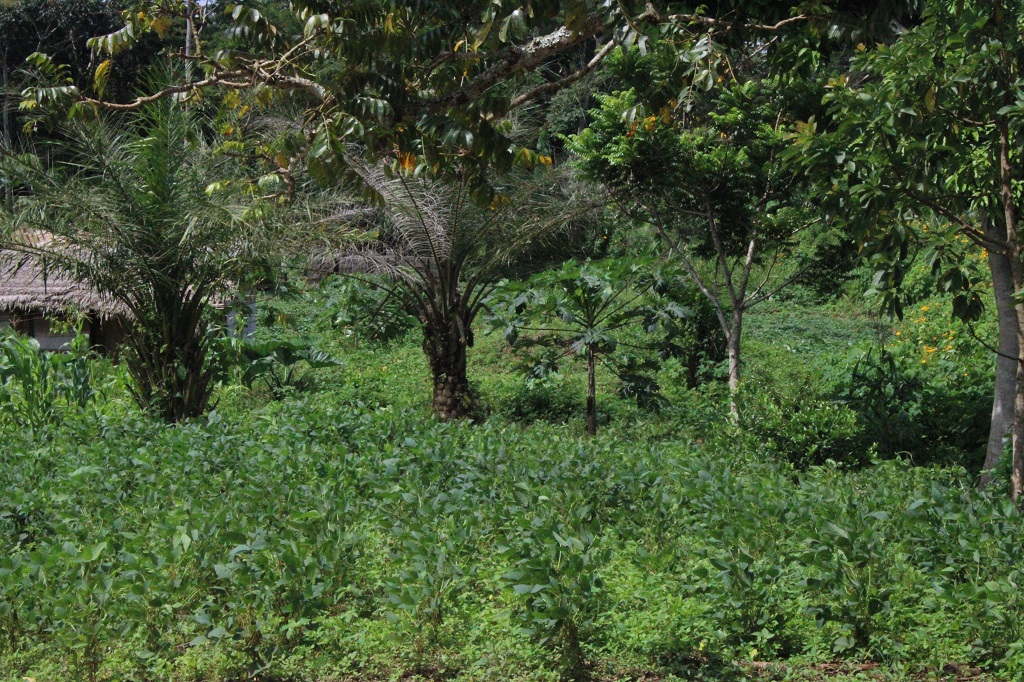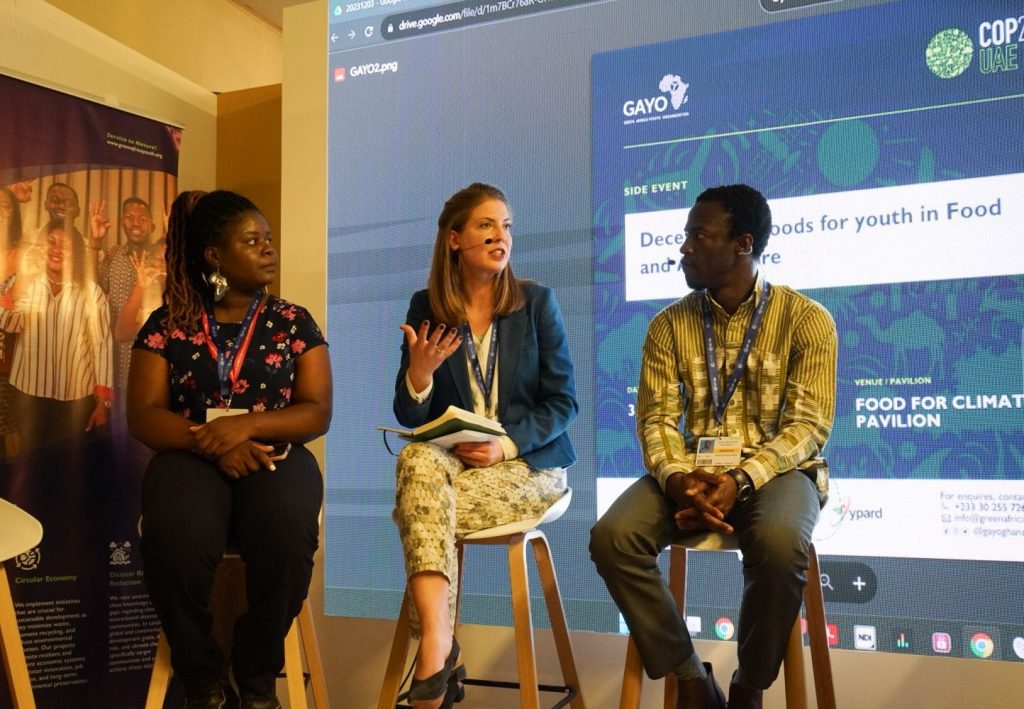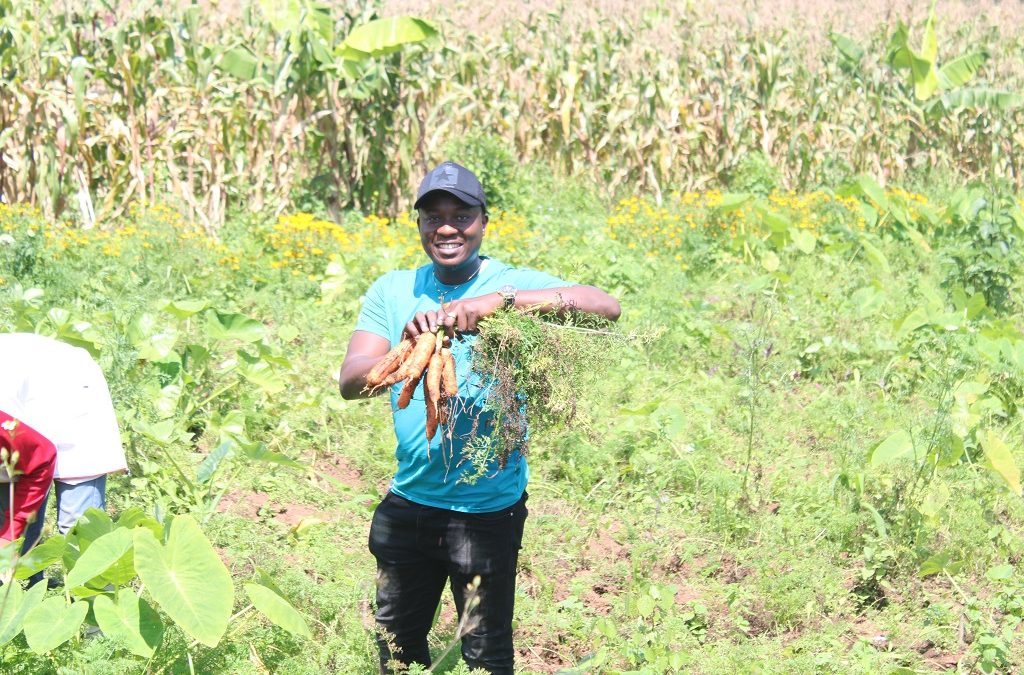As COP28 takes place in Dubai, we speak with Rodrigue Kouang from SAILD (Cameroon) and Genna Tesdall from Young Professionals for Agricultural Development (YPARD) to explore their commitment to agroecology and climate at this COP.
Agroecology can help countries achieve climate adaptation & mitigation targets. Diverse agroecological farming supports food security, livelihoods and resilience – helping to achieve climate justice. In this context there is a growing call to transform food systems in response to the enormous challenge brought about by the climate crisis.
Genna Tesdall reminded us, “If applied, the principles of agroecology would shorten supply chains and move away from synthetic fertilisers while restoring and retaining community agency in food systems.”
Rodrigue Kouang explained that the impacts of climate change are diverse and far-reaching for agricultural production. Agroecology is a sustainable farming system that preserves natural resources and increases the resilience of actors in the value chain. “Based on its principles, agroecology is a real solution for climate change adaptation and mitigation. We believe that agroecology is a major option in the fight against climate change,” he said.
Like many other civil society groups, members of the Agroecology Coalition, such as SAILD and YPARD are attending COP28 in Dubai.
According to Rodrigue Kouang, COP is a unique opportunity to make civil society’s arguments about the transformation of the food system heard. SAILD is seizing this opportunity to present its point of view, including that of its network of local partners, on the need to put agroecology at the heart of the climate change adaptation and mitigation debate. “Agroecology’s potential is not yet sufficiently exploited, particularly regarding food systems, which are particularly hard hit by the climate crisis. Greater appropriation of agroecological practices at the agroecosystem level would improve farmers’ resilience to climate change, whose activity represents the leading sector in Cameroon’s economy.” he said. Rodrigue explained that during COP28, SAILD plans to add their voice to those of other stakeholders to amplify the movement in favour of agroecology as a solution to climate change. “In this way, we hope governments and other political decision-makers will give significant space to agroecology in the COP 28 resolutions”.

Association of crops in a farm in the East region of Cameroon © SAILD
Cameroon, country member of the Agroecology Coalition, has already implemented several measures to promote agroecology. At COP 26, the State of Cameroon presented biochar as a solution for capturing and storing carbon emissions to reduce the effects of climate change. This practice, which meets all the criteria of an agroecological approach, was thus integrated into Cameroon’s climate strategy. Agroecology is widely used in Cameroon for climate adaptation, especially at the level of family farming systems. Most civil society organisations in Cameroon have adopted agroecology for sustainable agriculture.
Genna Tesdall takes part in COP to represent the voice of rural youth. She reminded us that the youth are crucial in shaping the present and future of food systems. Considering only the most conservative definition of youth (15-24 years), 16% of the global population is youth. However, if we expand the definition of youth to include individuals up to 35, the proportion of the world population becomes much more significant. “Young people have a lot at stake when considering the lack of action on climate change and food systems.” Said Genna. However, only 20% of climate finance is allocated to agriculture today (source: FAO). Even less of this goes to young people actively involved in food systems, even though most young people living in the “global South” are engaged in agriculture (source: 2021 HLPE to the CFS on Youth). Genna added: “Just imagine the impact we could have if young people were given the necessary resources and support.”

Genna Tesdall at COP28 © YPARD | Media contact: Trisha Mandal, Communications and Memberships Coordinator, trisha.mandal@ypard.net, +420 732 851 187
Genna explained that YPARD is a co-lead of the Youth Co-Host Food Systems Pavilion and a youth partner of the Food4Climate Pavilion. They also engage actively in the youth constituency to the UNFCCC, YOUNGO, through the YOUNGO Food and Agriculture Working Group; the policy positions of YPARD members get a chance to be represented through the collectively negotiated policy positions of YOUNGO. As co-lead of the Youth Co-Host of the Food Systems Pavilion (FSP), they also support the Youth Co-Hosts Policy asks in addition to the Pavilion’s policy asks for COP28. Furthermore, YPARD has signed on to the Non-State Actor Call to Action for Transforming Food Systems for People, Nature, and Climate.
Banner picture: Harvesting in a farmer field school in the west region of Cameroon. Credits: SAILD

